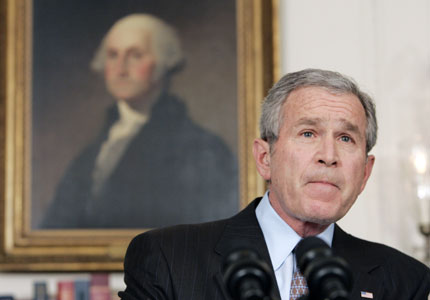Bush warns Dems to take offer in firings
(AP)Updated: 2007-03-21 07:28
Democrats' response to his proposal was swift and firm: They said they would start authorizing subpoenas as soon as Wednesday for the White House aides.
"Testimony should be on the record and under oath. That's the formula for true accountability," said Patrick Leahy, chairman of the Senate Judiciary Committee.
Bush, in a late-afternoon statement at the White House, said, "We will not go along with a partisan fishing expedition aimed at honorable public servants. ... I have proposed a reasonable way to avoid an impasse."
He added that federal prosecutors work for him and it is natural to consider replacing them. "There is no indication that anybody did anything improper," the president said.
Bush gave his embattled attorney general, Alberto Gonzales, a boost during an early morning call and ended the day with a public statement repeating it. "He's got support with me," Bush said.
The Senate, meanwhile, voted to strip Gonzales of his authority to fill U.S. attorney vacancies without Senate confirmation. Democrats contend the Justice Department and White House purged eight federal prosecutors, some of whom were leading political corruption investigations, after a change in the Patriot Act gave Gonzales the new authority.
Several Democrats, including presidential hopefuls Hillary Rodham Clinton, Barrack Obama, Joe Biden and John Edwards, have called for Gonzales' ouster or resignation. So have a handful of Republican lawmakers.
"What happened in this case sends a signal really through intimidation by purge: 'Don't quarrel with us any longer,'" said Sen. Sheldon Whitehouse, D-R.I., a former U.S. attorney who spent much of Monday evening paging through 3,000 documents released by the Justice Department.
Bush said his White House counsel, Fred Fielding, told lawmakers they could interview presidential counselor Karl Rove, former White House Counsel Harriet Miers and their deputies ¡ª but only on the president's terms: in private, "without the need for an oath" and without a transcript.
The president cast the offer as virtually unprecedented and a reasonable way for Congress to get all the information it needs about the matter.
"If the Democrats truly do want to move forward and find the right information, they ought to accept what I proposed," Bush said. "If scoring political points is the desire, then the rejection of this reasonable proposal will really be evident for the American people to see."
Bush said he would aggressively fight in court any attempt to subpoena White House aides.
"If the staff of a president operated in constant fear of being hauled before various committees to discuss internal deliberations, the president would not receive candid advice and the American people would be ill-served," he said. "I'm sorry the situation has gotten to where it's got, but that's Washington, D.C., for you. You know there's a lot of politics in this town."
Sen. Chuck Schumer, who is leading the Senate probe into the firings, spoke dismissively of the deal offered by the White House:
"It's sort of giving us the opportunity to talk to them, but not giving us the opportunity to get to the bottom of what really happened here."
Even without oaths, Bush aides would be legally required to tell the truth to Congress. But without a transcript of their comments, "it would be almost meaningless to say that they would be under some kind of legal sanction," Schumer complained.
Fielding's meeting on Capitol Hill came a few hours after Bush spoke with Gonzales in an early morning phone call ¡ª their first conversation since the president had acknowledged mistakes by his longtime friend and lawmakers of both parties had called for Gonzales' ouster.
The White House offered to arrange interviews with Rove, Miers, deputy White House counsel William Kelley and J. Scott Jennings, a deputy to White House political director Sara Taylor, who works for Rove.
"Such interviews would be private and conducted without the need for an oath, transcript, subsequent testimony or the subsequent issuance of subpoenas," Fielding said in a letter to the Senate and House Judiciary committees and their ranking Republicans.
He said documents released by the Justice Department "do not reflect that any U.S. attorney was replaced to interfere with a pending or future criminal investigation or for any other improper reason."
|
||
|
||
|
|

